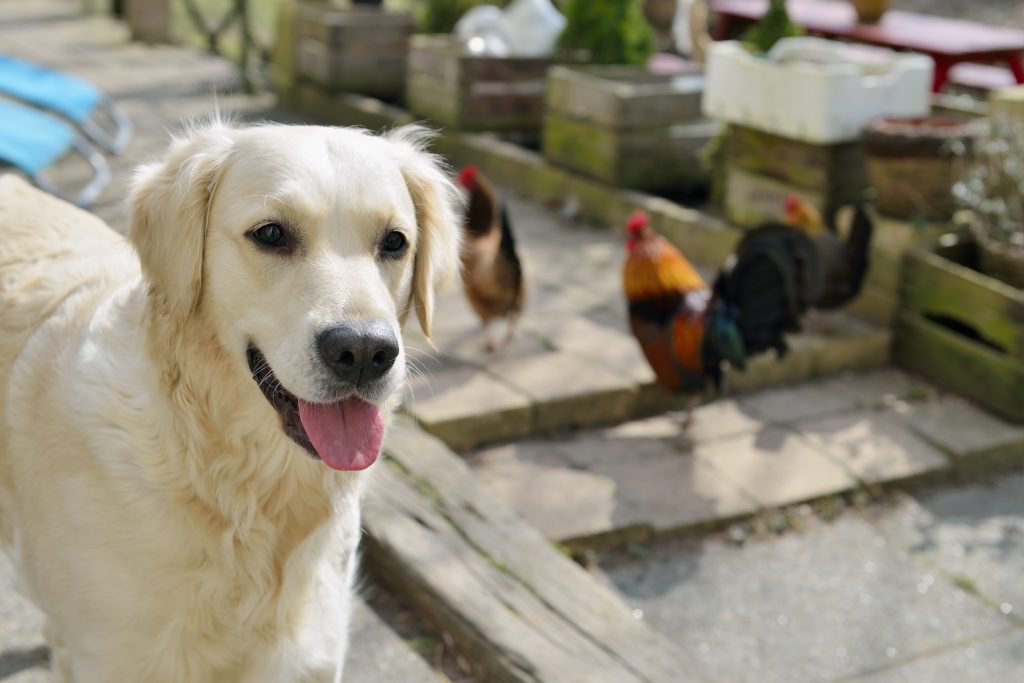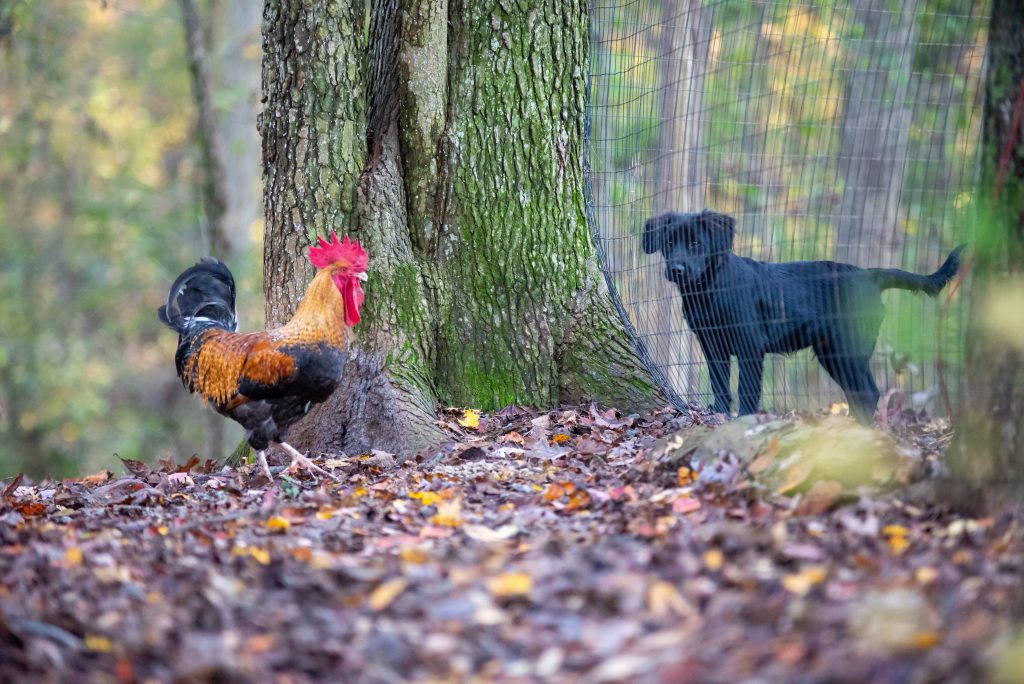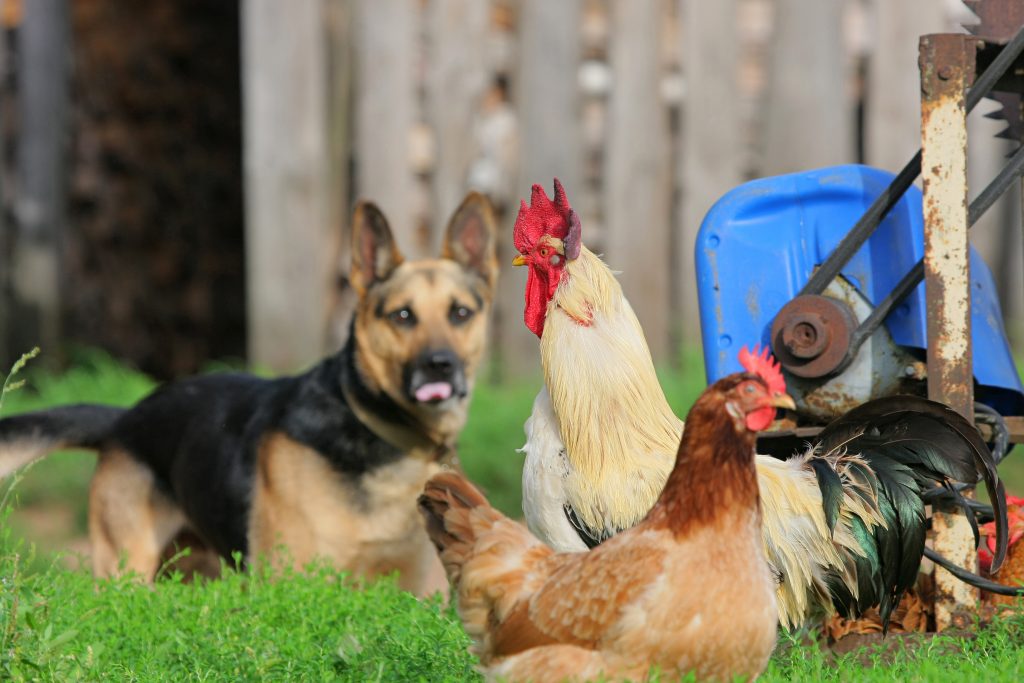We all know dogs are territorial creatures by nature. They mark their scent on walks to say, “I was here”. And they are generally protective of their space and their family.
So, introducing any new pets into their yard – especially chickens which flap and squawk and suddenly dart after a bug – carries a risk of a poor reception.
And with free range backyard chickens increasing in popularity, hens and dogs are increasingly crossing paths.
In time, most dogs can become perfectly happy to share the backyard with chickens. Some become the best of friends – long-haired dogs can even welcome chickens walking all over them picking grass seeds out of their fur: a win-win for everyone!
Here’s some tried and tested tips on how to introduce your dog to chickens.
Breeds matter
Believe it or not, the success of welcoming chickens into your home can depend on your dog’s breed.
“Hunting, herding or other working breeds may be more inclined to chase or attack smaller prey animals such as chickens,” notes ACS Distance Education.
“Traditionally gun dogs such as Setters, Retrievers, Pointers etc., have been bred to help hunt and retrieve game birds for their human owners. So, they’re natural instinct may not necessarily be to get along with feathered friends. Though with the right introduction they may be fine, just take care when introducing them.”
The education provider continues by noting that “herding breeds such as border collies, healers, kelpies etc. have been bred to herd livestock, so while they may not necessarily attack the birds, they may stress them out by herding them around the backyard. So, keep an eye out for any herding behaviour that may stress the birds.
“Terriers have been bred for the chasing and killing of vermin (such as rabbits, rats, mice). Due to this background, they usually have a high prey drive –keep this in mind when introducing them to your new chickens.”
But every dog is different too: their ability to co-exist peacefully can depend on their temperament, any previous mistreatment if they were adopted, or any previous exposure they have had to chickens or other birds.
As such, consider your dog’s personality and temperament as well as their breed to determine their suitability for living with chickens before you commit to getting a flock of your own.
(See the list of most popular dog breeds in Australia here.)

Create their own spaces
How to introduce your dog to chickens also depends on where your new girls will live. Depending on the size of your yard, you may be able to portion off part of it as a dedicated chicken run. That eliminates the need for them to co-mingle at all!
This could incorporate any fruit trees you have, since the chickens will help with fertilising, soil aeration and pest control. An unused long, thin strip of land is ideal: such as alongside a driveway or pool. Or make use of a barren patch where the grass never seems to grow.
It’s best to leave any lawn space to your dog, for them to use for playing and toileting. Chickens will eat and dig up any grass they can access anyway.
A word of caution: be careful what fencing material you use. If it’s too low, your chickens will be able to fly over it. If the wire gaps are too large, they can put their heads through and get stuck. Also, check the bottom of the fence line – you don’t want to go to all the effort just for your dog or, worse, a fox to break in with a bit of digging.
Do the sniff test
It’s a good idea to stage manage the initial meeting when you first bring home your new chickens.
Keep your dog on a lead or, better still, on the other side of a fence or gate which they can still see (and smell) through. Your dog should be kept as quiet and calm as possible, so as not to frighten the chickens.
Have someone else hold the chickens – keep them quiet and still too, so as not to overly excite your dog.
Let them see one another and give your dog the chance to have a good sniff. Get your dog to become familiar with their scent; to learn that the chickens now live there too and aren’t some temporary invader. Having your scent attached to the chickens too may help your dog make this connection.
Reward your dog if they are good and gentle.
Give them time apart
In the early days, it’s good to give your dog space from your new feathered friends.
The chickens need time to adapt to their new home. They must learn where they should sleep, where their food and water are, and where to lay their eggs. It’s much less stressful for them to settle in without a dog pacing along the perimeter of their enclosure.
This time apart should benefit your dog too. He or she should be less anxious about these newcomers invading “their” backyard if there’s a bit of distance between them.
Additionally, your chickens may have some initial squabbles among themselves as they determine the pecking order in their new home. This could excite, frighten, or tempt your dog if he or she is too close.
Let your dog see and smell them from afar. Put up a strong temporary fence if you need to.

How to introduce your dog to chickens? Gradually!
Once you are satisfied that your dog is ready, let your dog freely go up to the chickens in their coop. Watch carefully for any pacing, barking, or digging. But at first, don’t let your dog have unfettered access at night while you’re asleep. Fence the area off again or keep your dog inside overnight.
Once you’re confident your dog is comfortable with the chickens in their pen, then you can try them having full yard access overnight.
The final step is to introduce your dog to the chickens when they are free ranging in the yard. Again, do it gradually, first with your dog on a leash and then free to roam while you are present.
Then progressively increase your distance from them all, allowing your dog and chickens to mingle.
After a while, you can try leaving them alone in the yard together briefly, while still watching from a hidden spot or through a window.
Remove temptations
A happy, healthy dog may be less likely to act out against your chickens. Undesirable behaviour in dogs can have a variety of root causes, such as they:
- are bored
- haven’t been exercised enough
- are stressed or anxious
- are seeking attention
- feel threatened and are defensive
- are hungry
It could also be that your dog simply doesn’t know their behaviour is bad – he or she may innocently want to play with the chicken. They may not realise that the chicken doesn’t feel the same way, or that they are being too rough!
So, ensure your dog is properly fed, exercised, socialised, and entertained to remove the temptation to play chase or crave a snack.
Feed them separately
Speaking of feeding your dog, it’s important not to feed him or her within reach of your chickens.
Dog parents know that it can be dangerous to take food away from a dog; but chickens don’t understand this risk. A greedy hen may come off second best if your dog tries to stop her from stealing food.
That goes for everything you feed your dog: meals, treats and bones (yes, chickens will even try and peck at dog bones!)
Don’t let your dog gorge on chicken food either: you may inadvertently cause your chickens to starve and your dog to become unwell. Chickens should be fed in their pen using a proper feeder, which your dog can’t reach. Give them treats or scratch mix away from your dog too.

Other behaviours
It’s not just you dog attacking chickens you need to be aware of.
Once your chickens start laying, eggs become a tempting treat for any dog allowed access to them! Be sure your dog can’t access the nesting boxes if you want to be the one enjoying the fresh eggs.
Another unpleasant behaviour you will likely encounter is poop-eating. No, not the chickens! Many dogs can’t help themselves and will lick up any chicken poop they encounter.
You can reduce this by simply hosing down the yard when your chickens go to bed for the evening: their poop washes easily into the soil.
Be alert
Sometimes, for no apparent reason, a dog will chase or attack a chicken. Even if they have lived with chickens for a long time.
There are many possible reasons why this may have happened so unexpectedly:
- perhaps the dog had been bored and thought chasing chickens would pass the time
- maybe that particular chook was sick
- the chicken was somewhere they shouldn’t be
- the chicken may have startled the dog
- a fight erupted over food or water
The answer isn’t always obvious, or even attainable. So, it’s important to supervise your dog around your chickens – especially if they are free-range – to ensure everyone can co-exist peacefully!










